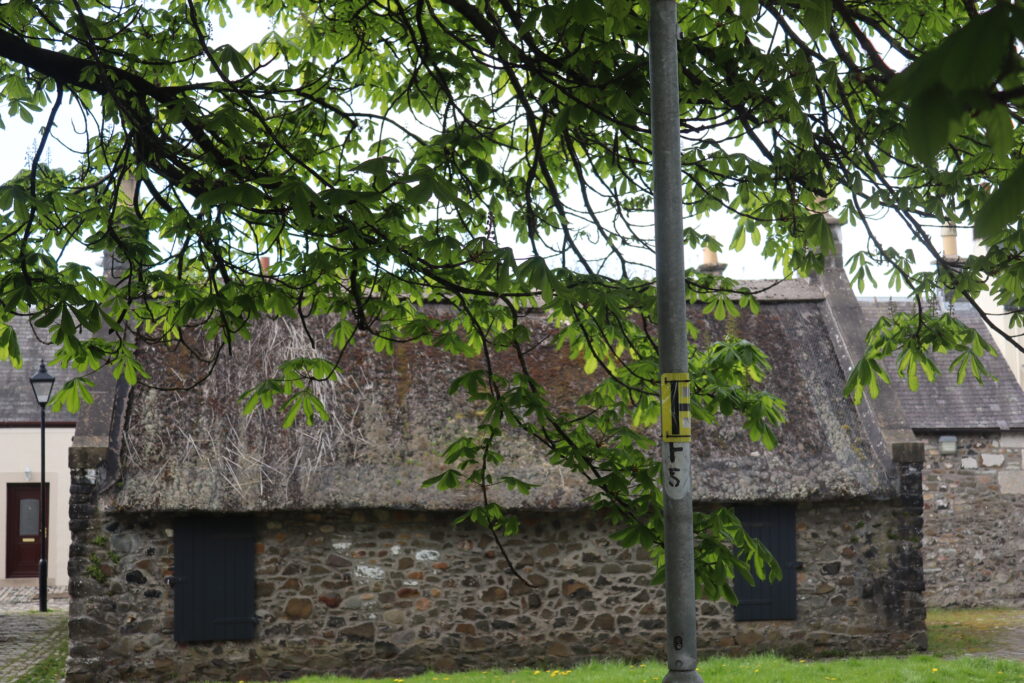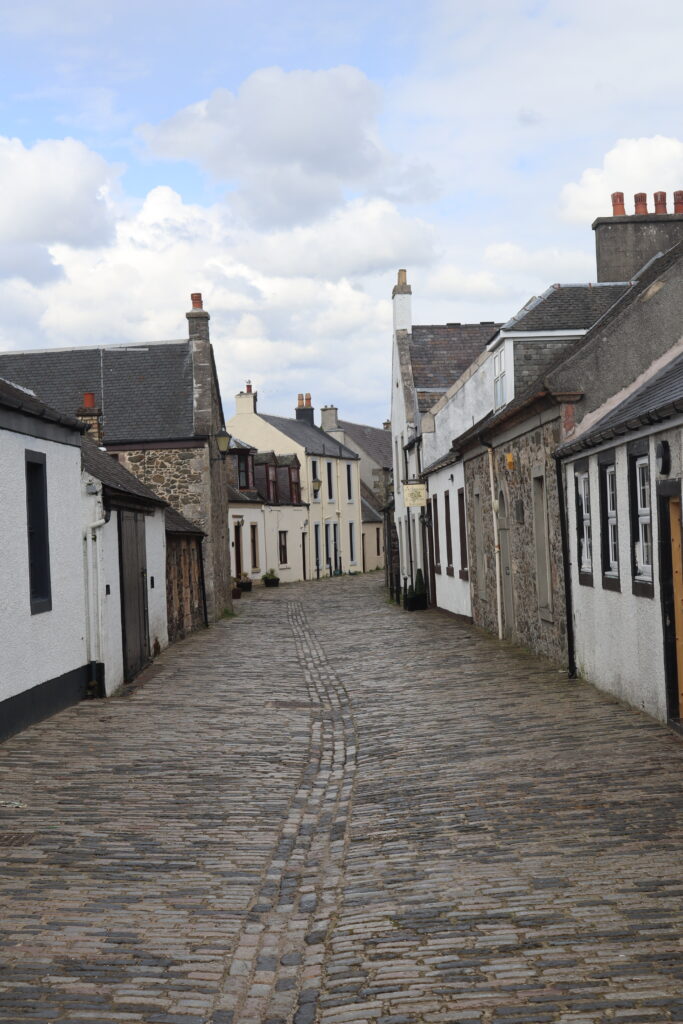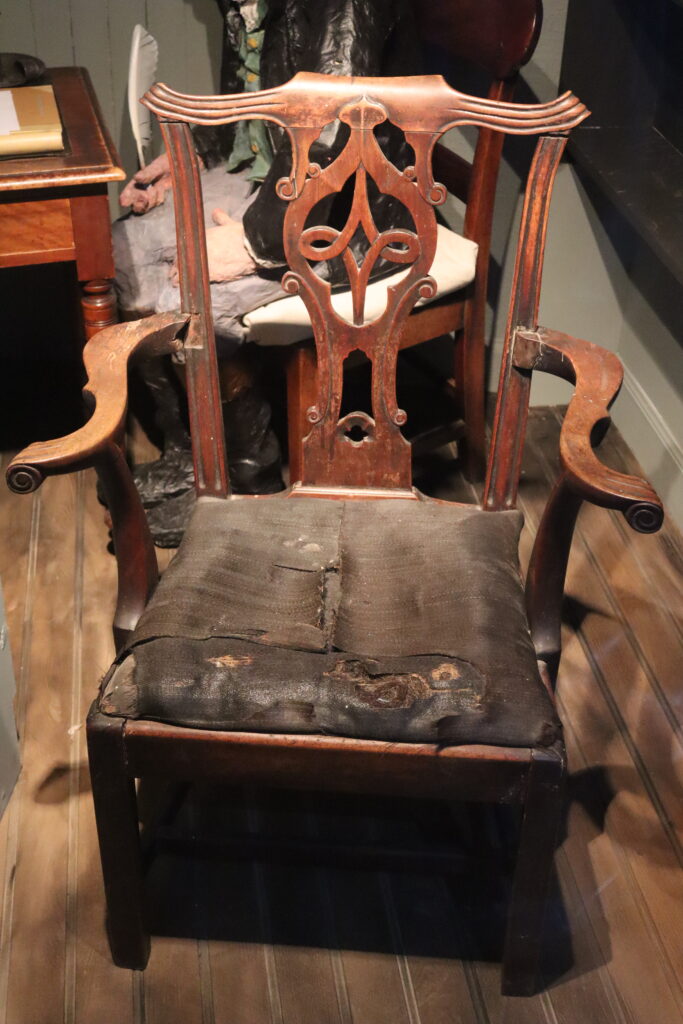Robert Burns and his younger brother Gilbert were encouraged by their father to grow acreage of flax on the family farm at Lochlea. There was also some level of encouragement from the government to raise the crop, though the viability of the crop would subsequently be challenged by imported cotton from America. The treated flax would then be woven as linen. This was also the time for Burns of social interaction with the nearby villagers of Tarbolton and where he would establish the famous ‘Batchelor Club’.
A significant amount of manual labour was required to process the crop where the fibres of the plant were separated in a process called ‘heckling’. Around October of 1781 Burns would leave the farm at Lochlea and venture to the coastal town of Irvine to become a ‘flax dresser’ – in the process joining the obligatory trade guild. His lodgings and the ‘heckling shop’ were located in the town’s Glasgow Vennel where the lodging house and the heckling shop with its thatched roof are still eminently visible. The ‘heckling shop’ is currently in private ownership and access is restricted. The working conditions, however, were poor due to the dusty environment and poor ventilation. It is recorded that Burns may have used the loft in one of the work buildings before staying in lodgings at number 4 Glasgow Vennel. The ‘heckling shed’ was restored around 1982 by the local authority.
His business partner was a certain Andrew Peacock, a half brother of his mother, though Burns would come to describe him as ‘ a scoundrel …who made money by the mystery of thieving’. There is a record that Peacock was removed from membership of the Masonic Lodge in Irvine for reasons unknown.

Of note also in Glasgow Vennel is the one time meeting house of the ‘Buchanite Sect’ of Irvine whose followers of were at the opposite extreme of Presbyterian restraint and moderation in all things. Their presence fired social and religious tensions and the sect was banished from the town in 1784.

While an intended step of independence, the venture would unfortunately unravel. Burns became quite unwell around November, falling into a deep depression. His elderly father would pay him a visit in December and Burns would later write a deeply troubling letter in which he almost welcomed the idea of ‘not making it’. A local doctor Dr. Fleeming would attend Burns, as evidenced by entries in his daybook, now in possession.of the Irvine Burns Club in Wellwood House.
Compared to the windswept and exposed Lochlea Farm, Irvine must have been a much more unhealthy environment. Perhaps that was why so much ale was drunk rather than the local water. Also Burns’ diet, never fancy by any any account, would likely have deteriorated in Irvine, dependent as he was on a sack of meal for nourishment.
If things had not been going well, worse was to follow. On the occasion of Hogmanay Andrew Peacock’s wife accidently knocked over a candle in the heckling shop where a merry throng had gathered to bring in the New Year. This resulted in a fire which took hold and destroyed his place of work. Burns would return to Lochlea Farm around March of 1782, apparently in a measure recovered, though the episode would at times cast a shadow over his future life.
While Irvine did have its lows, there were some positives. He befriended a bookseller in the town, a certain William Templeton who gave Burns access to its contents which also included newspapers and printed songs. Of special significance was that Burns discovered the works of the Edinburgh poet Robert Ferguson in the bookshop and which was a stimulus for him to produce his own poetry. Burns would also enjoy the hospitality of Templeton’s house in Irvine. In Wellwood House in Irvine there is what is claimed to be his ‘favourite chair’ from such visits. The chair was in fact gifted from Australia where it had been taken by relatives of the Ferguson family. Also he made the acquaintance of Captain William Brown who would very significantly encourage Burns to publish his poetry collection. This would lead to the publication of the famous ‘Kilmarnock Edition’. The eventual success of the edition would no doubt have lifted the poet’s spirits.
